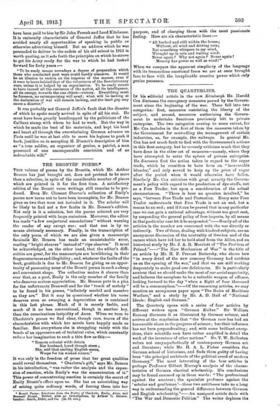THE BRONTES' POEMS"
Tule volume of poems by the Broutia, which Mr. Arthur Benson has just brought out, does not pretend to be more than a selection, in spite of the considerable number of pieces which are printed in it for the first time. A satisfactory edition of the Bronte 'verse writings still remains to be pro- duced. Even Mr. Clement Shorter's collection of Emily's poems now turns out to have been incomplete, for Mr. Benson gives us two that were not included in it. The scholar will be likely to find not a few faults in Mr. Benson's edition. Not only is it a selection, but the poems selected are very frequently printed with large omissions. Moreover, the editor has made "a few conjectural emendations" without warning the reader of any except one: and that one is by no means obviously necessary. Finally, in the transcription of the only poem of which we are also given a manuscript facsimile Mr. Benson has made an unmistakable error, reading "bright sheaves" instead of " ripe sheaves." It must be acknowledged, on the other hand, that the editor's diffi- culties are great, for the manuscripts are bewildering in their fmgmentariness and illegibility ; and, whatever the faults of the book, gratitude is due to Mr. Benson for giving us an oppor- tunity of possessing some of the Bronte poems in each a cheap and convenient shape. The collection makes it clearer than ever that, as a poet, Emily is the only member of the family who deserves serious appreciation. Mr. Benson puts in a plea for the unfortunate Branwell and for the " touch of melody " to be found in his poems, "infinitely morbid and macabre as they are." But it may be questioned whether his verse deserves even so sweeping a depreciation as is contained in this last phrase. Much of it is merely feeble, arid much of it no less conventional, though in another key, than the conscientious insipidity of Anne. When we torn to Charlotte's poems we find clear, though rare, traces of the characteristics with which her novels have happily made us familiar. But everywhere she is struggling vainly with the bonds of an oppressive set of technical rules, which constantly reduce her imagination to each a thin flow as this:— " Remote colonial wilds detain
Her husband, loved though stern g She, mid that smiling English scene, Weeps for his wished return."
It was only in the freedom of prose that her great qualities could reveal themselves. " Charlotte's gift," says Mr. Benson in his introduction, " was rather the analysis and the expan- sion of emotion, while Emily's was the concentration of it." This power of concentrating emotion is certainly the secret of Emily Bronte's effect upon us. She has an astonishing way of seizing quite ordinary words, of forcing them into her
• Erode Poem, &Whew fcen the Poetry of Chiclotte, Emily, lam, wed Brothwil Brouth. Edited. with ea Introduction. by Arthur C. seems. London: smith, Elder, end Co. Da 6d. net.] purpose, and of charging them with the most passionate feeling. Here are six characteristic lines:-
'•
All hushed and still within the house'
Without, all wind and driving rain; But something whispers to my mind, Wrought up in min and wailing wind, Never again ? Why not again P Never again
Memory has power as well as wind!"
When we compare the apparent simplicity of the language with its tremendous emotional force we are at once brought faen to face with the inexplicable creative power which only genius possesses.














































 Previous page
Previous page